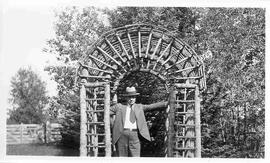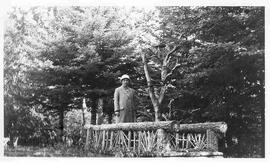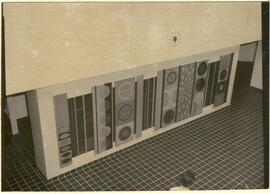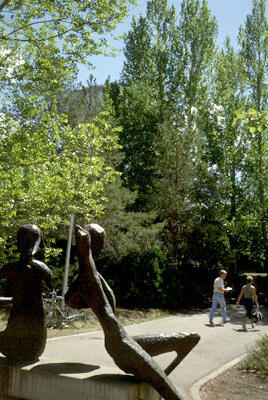The fonds, related to the Swift Current Tourism Committee, the Horseshoe Tourism Region, Quota Club, Swift Current Natural History Society, Swift Current Rotary Club, Swift Current Indians, Hall's Legionnaires, Swift Current Broncos, Swift Current and District Men's Fastball League, curling, Museums Association of Saskatchewan - Prairie Trails Museum Network, and the Swift Current Museum were accumulated by the source. No other information was captured at the time of transfer to the Swift Current Museum for records not generated by the Museum.
The content has not been professionally appraised, arranged, or described. The following is a basic listing of the unprocessed contents:
A.1996.3 (Swift Current Natural History Society)
- Saskatchewan Natural History Society newsletters
- Swift Current Museum Newsletters
- Receipt book from Swift Current Museum Board
- Various letters and correspondence
A.1997.7 (Quota Club)
-program, Charter night March 1936; “Guest Log” 1938 – 1956 (wooden covers); duo-tang “Quota Club International Incorporated District Eleven Roster Revised 1954", contains names, phone numbers and occupations of all members in all cities in District 11 (including Manitoba, Alberta, and Saskatchewan); scrapbook containing photos, newspaper clippings from 1936 - 1960, list of Charter members: Gladys Andrews; Margaret Andrews; Lily Brooksbank; Muriel Cameron; Isabel Carmichael; Mildred Grinder; Ruby Klingman; Alda Lamm; Flora Law; Ruby Martin; Effie Marlatt; Gwen May; Florence MacWilliam; Marguerite MacWilliam; Alice Wik; and Marie Young, printed brochures for Quota Club International, two badges for the H.M.C.S. Minesweeper Swift Current (one bearing an image of the bulldog, Winnie); Swift Current brochure ca. 1950s, campaign material to get Genevieve Begg elected as President of Quota Club International, a copy of "Golden Furrows", other Quota Club material.
Photo list:
- float in a parade, a priest preaching to people in aboriginal costume, "D. McIntyre" on the cab of the truck
- photo of the Swift Current Quota Club charter from 1936
- Vimy Ridge Memorial, July 26, 1936, taken by Lily Brooksbank
- a young woman wearing a crown and a white gown, Jean, voted 'Queen of the Home Front", Frontier Days parade, ca. 1941
- Kinetic Club float in Frontier Days parade, ca. 1941
- Quota Club float in a Frontier Days parade, likely International Days, 1939
- Quota Cub float in the Frontier Days parade, ca. 1940-41
- a young woman wearing a nursing uniform on the front steps of a house, identified as Miss Marie Young
- photo of the H.M.C. Minesweeper "Swift Current"
- Gladys Chattergoon, recipient of the International Quota Club scholarship, 1952
- an unidentified woman in a white gown sitting on a couch
- photo of the Grace Atkinson trophy for Publicity and Public Relations
- Anne Morrison of Swift Current presenting something to Gladys Herrington, the first Canadian president of Quota Club International
- headshot of young women, identified as Shirley Weese, scholarship winner from Winnipeg
- three women packing Christmas hampers, 1955, identified as Genevieve Begg, Margaret Webster, and Alice Belbeck
- Genevieve Begg
- a cake on a dining room table, June 13,1956
- two women in a living room, identified as Mary Moore and Margaret Webster, June 13,1956
- Quota Club members in a living room, identified as: Effie Marlatt-Biro, Eva Pfeiffer, Esther Coombs, Mildred McKenzie, Connie Stark, Mary Moore, Alma Hawthorne, Genevieve Begg, Trudy Wharton, Bernice Chalmers, Barbara Morice, Margaret Webster, Dorothy McCullough, Maude Elliott
- Mr. MacAinsh, resident at Prairie Pioneer Lodge, choosing a book from the library set up by the Quota Club, with Reta Moran, Ruth Bissell, Alma Hawthorne, Mona Smith, 1958
- Quota Club members in a living room: Barbara Morice, Mrs. Woods, Anne Allen, Ruth Bissell, Mona Smith, Madeline Carroll, Mildred McKenzie, Alma Hawthorne, Reta Moran, Florence Desjardines, Genevieve Begg, Bernice Chalmers, Effie Marlatt-Biro, Lillian Peel, Mary Genereux
- small photo of Maude Elliott
Women in newspaper photograph or headline, identified as: Mrs. E.J. White, Nan McNie, Heather McIntosh, Anne Morrison, Mrs. A.B. Elloitt, Jean MacKay, Mrs. P.J. Dean, Mrs. Verda Towne, Marie Young, Genevieve Begg, Dorothy McWilliam, Grace Atkinson, Maude Elliott, Constance Stark, Florence Latimer, Florence Desjardines, Mae Davidson, Beatrice English, Alice Belbeck, Mrs. A.P. Mckenzie, Reta Moran, Dolores Crisp, G.E. Agnott, Donna Booker, Jacquie Baxter
Women in 1981.x.2
Top row: Florence MacWilliam, Alice Wik, Maude Elliott, Flora Law (later Puckett), Alda Lamm, Frieda McIntyre, Greta McWilliam (later Whiteside), centre row: Gwen May, Effie Marlatt (later Biro), Dorothy McWilliam, Ruby Scott, Lily Brooksbank, Alice Mitchell, Mildred Grinder (later McKenzie), front row: Gertrude Keyl, Marie Young, Jean Webster, Agnes McKay
A.1997.8 (Swift Current Rotary Club)
-consists of an album containing personal statements from homesteaders in Swift Current, complied in 1955 and commemorating Saskatchewan's 50 year anniversary (all names are alphabetical). Each page contains a name, the dates that the person resided in Swift Current, where they lived in 1955, their date and place of birth, personal remarks, and a signature.
A.1999.9 (Swift Current Museum)
Box #1.
-ledger, Swift Current School Museum Catalogue, contains information on collections; 1933 - 1934
-museum guest book; 1984 - 1990
-report, "Report on Development of Swift Current Museum"; 1960
-Swift Current Museum profile, December 31, 1988
-Swift Current Museum Board receipt book, June 4, 1966 to June 30, 1989
-ledger, Swift Current Museum; January 1, 1983 to May 18, 1991 (record of gift shop sales)
-folder #1: miscellaneous correspondence between Museum representative and other parties, 1968-1970; bylaw "to provide for the appointment of a Board of Governors of the Thoreson Memorial Museum"; notes on some of the collections; article re: move of museum, 1977.
-folder #2, Gala 85: museum trivia contest, 1985; ad for Heritage Gala'85, 1985; list of "Pioneers";
Heritage Week, 1985
-folder #3, Correspondence: miscellaneous correspondence between representatives of the museum and various recipients, 1971 - 1974
-folder #4, Swift Current Museum newsletters from the 1960s and 1970s: copies of the Swift Current Museum newsletter from volume 1, number 1 to volume 11, number 8
-folder #5, correspondence, re: curator Vera Wilson enrollment in a Canadian Museums Association Training Program
-folder #6: Museum and Gallery (Operating) Grant Applications Forms, 1982 - 1989; Operating Budget Document, 1990; City of Swift Current Financial Statements, December 31,1982; City of Swift Current Financial Statement, December 31,1988
-folder #7: miscellaneous correspondence between representatives of the museum and various recipients, 1974 -1991
-folder #8: minutes of Board meetings, 1964 to 1990; financial and budget documents, 1969 to 1991 (not every year); 1989 Activity Report; correspondence, re: Board members, City Councilors, re: Holderbein collection, re: curators Lillian McBean and Vera Wilson, re: finance, etc.; "A Brief regarding a new Swift Current Museum"; memo from Director of Finance, re: Six Year Capital Budget, 1989; Annual Reports, 1965-1966 to ca. 1974
-folder #9 Merlin Rosser: resume; museum report, 1993, re: museum accomplishments and what still needs to be done, short and long term initiatives; employment paperwork for Merlin Rosser re: going to meetings, conferences
-folder #10, 75th Anniversary Souvenirs: receipts, ledgers, stock requests, etc. re: City of Swift Current 75th Anniversary souvenirs, 1989
-folder #11, Financial Statement: City of Swift Current account inquiry, 1994; City of Swift Current budget appropriation for Museum, 1993, 1994; City of Swift Current listing of program distributions, 1989 - 1991, 1993; City of Swift Current budget appropriation for Art Gallery, 1993
-folder #12, Glenbow Museum: correspondence with Glenbow Museum re: traveling exhibitions (Eskimo Life - Lomen Brothers, Contemporary Indian Artists, The Totem, The Buffalo, Eskimo Prints - Cape Dorset, Africa, Mineral, Plains Indian); "Glenbow Art Circuit 1970 - 1971"; Swift Current Museum newsletter, vol. 1, no. 8; "Glenbow Art Circuit 1971 - 1972"
-folder #13, Electronic Tour: the museum and the Swift Current Lions Club purchased an electronic audio tour of the displays, 1967
-folder #14, Casual Staff, "Swift Current Museum Board Requisition for Payment to City Of Swift Current" forms requesting staff payment; correspondence with John Dyer re: staff payment
(1990 - Sun article about potential upgrades to RC Dahl centre)
Box #2.
Folder #1, Museum History (Swift Current): correspondence between Dr. C.R. Strother-Stewart, Chairman of the Swift Current Museum Board, and Fred Bard, Director of the Saskatchewan Museum of Natural History, re: labels, cases specimens, for the Swift Current museum, 1969; floor plan of Swift Current Museum; bylaw, "A By-law of the City of Swift Current respecting an Agreement between the City of Swift Current and the Executors of the Estate of the late Charles Thoreson, Deceased"; brochure for the Official Opening of the "Swift Current Museum (Thoreson Memorial)", located beneath the public library in the W.A. Beatty Collegiate,1964; document, "A Brief History Regarding A New Swift Current Public Library", 1965; brochure for the Swift Current Museum at the Chaplin Street location, 1983; map, Swift Current Downtown Tourist Guide, ca. 1964 - 1973; document, "The Societies Act/ Application For Incorporation" for the Swift Current Museum (Thoreson Memorial Museum), 1968; correspondence between Dr. Strothers-Stewart, Chairman of the Museum Board, and the Library Inquiry Committee, re: a request to increase the interaction between the Swift Current Museum and Library, 1966; speech, re: campaign for a Museum-Library complex to be situated in the former Armoury building, 1968; document, "A Brief regarding a new Swift Current Museum, to be considered in conjunction with the Brief regarding a new Swift Current Public Library", ca. 1964 to 1973; documents and correspondence pertaining to the incorporation of the Thoreson Memorial Museum under the Societies Act; documents pertaining to goals of the Swift Current Museum, hiring a full time Director; speech, "Large and Small Museums: A Subjective View", J.D. Herbert, Winnipeg, MB, 1966; correspondence from Mrs. Vera Wilson (Clarence) who became curator in 1971; newsletter, Saskatchewan Natural History Society, May 1971
Folder #2: correspondence, re: appointment of Vera Wilson as curator, 1971; misc. correspondence between City Commissioner Murray Butterfield and Secretary-Treasurer J.A. Dyer, pertaining to the Swift Current Museum, 1973, 1974; Annual Report of the Swift Current Museum, 1967 - 1968, 1973; descriptions of firearms in the Museum collection; applications for the position of curator at the Swift Current Museum; job advertisement in the Swift Current Sun; financial information for the Swift Current Museum, 1967 - 1970; correspondence re: an Electronic Guide, supported by the Lions Club; Swift Current Museum board meeting minutes, August 1965, March and October 1967; correspondence, re: insurance of the contents of the Swift Current Museum; recorded hours of Museum paid staff; Swift Current Museum Newsletter, Vol. 1 No. 1, features information about the Museum's passenger pigeon
Folder #3, Museum File: Swift Current Museum Newsletters, Vol. 9 Nos. 3, 4, 5, 6, 7, 9, 10, 1974; Vol. 10 Nos. 1, 2, 4, 7; correspondence pertaining to Museum financial information, highway signs, sound system, wages for part-time staff, seating, etc. 1974 - 1975
Envelope #1: financial statements for "The Swift Current City Museum Board", August 1963 - December 1972
Envelope #2: deposit slips for the Bank of Montreal, 1966; handwritten deposit record; Bank of Montreal deposit book for "The Swift Current City Museum Board", 1965 - 1966
Envelope #3: six cheque stub books, from April 1961 - June 1975; one blank cheque book; three Bank of Montreal deposit slip books, April 1961 to September 1974
A.2001.3 (Swift Current Tourism Committee / Horseshoe Tourism Region)
Items pertaining to Horseshoe Tourism Association Inc. & SC Tourism Committee:
- Correspondence
- Newsletter – "Around the Horseshoe"
- Brochures / pamphlets
- Booklet – Official Travel Guide to Southwest Saskatchewan
- 1995 Official Service & Event Guide (Horseshoe)
Swift Current Tourism Committee
- Correspondence
- SWRA News (South West Recreation Association)
- Minutes, Tourism Swift Current 1995 - 1998
- Letters / Correspondence
- Host Program Options
- Minutes
- 'Discover Swift Current Saskatchewan 1998', booklet
A.2004.10 (Swift Current Museum)
Assorted documents, mainly 1960s.
A.2007.18 (Amateur Hockey Teams)
Series 1:
Title: Swift Current Broncos
Dates: 1983-85
Extent: 2 cm textual records
Scope and content: Series contains schedules, correspondence, information on individual players and games
Photographs:
1. Swift Current Broncos, no year
Series 2:
Title: Swift Current Minor Hockey 'A' Tournament of Champions
Dates: 1979, 1983
Extent: 2 cm textual records
Scope and content: series contains schedules and reports, book entitled “Eleventh Annual Tournament of Champions”, 1979
Series 3:
Title: Swift Current Minor Hockey Association Interprovincial Midget 'A' Tournament of Champions Official Score Sheets
Dates: 1984
Extent: less than 1 cm textual records
Scope and content: series contains Swift Current Minor Hockey Association Interprovincial Midget 'A' Tournament of Champions Official Score Sheets
Series 4:
Title: Broncos Rodeo
Dates: 1984
Extent: less than 1 cm textual records
Scope and content: series contains information pertaining to the Swift Current Bronco’s Professional Indoor Rodeo; biography of rodeo clown Ernie Marshall
Series 5:
Title: Former Broncos
Dates:
Extent: less than 1 cm textual records
Scope and content: series contains: a newspaper feature on Brian Trottier; photo of Ross Lambert; photo and resume of Dave Schultz
Photographs:
2. Dave Schultz
3. Ross Lambert
Series 6:
Title: Hall’s Legionnaires
Dates: 1983-84.
Extent: 1 cm textual records
Scope and content: series contains official score sheets, schedules, statistics and league standings, photograph
Photographs:
4. Hall’s Legionnaires hockey team
Series 7:
Title: Saskatchewan Amateur Junior Hockey League: Swift Current Indian’s Hockey Club
Dates: 1985-86.
Extent: 2 cm textual records
Scope and content: series contains team standings; league statistics; press releases; programs
A.2007.19 (Swift Current and District Men's Fastball League)
Envelope #1.
Title: Kyle Merchants
Dates: 1983
Extent: 10 photographs
Scope and content: series contains the following photographs –
1. Gord Neustater
2. Derryl Hildebrandt
3. Ray Robinson
4. Rempel
5. Alvin Rempel
6. Roy Fehr
7. Corny (Cornie) Redekopp
8. Reg Robinson
9. Rod Neustater
10. Marcel Geinet.
Missing: Darcy Fehr; Peter Fehr.
(Kyle Kin. Merchants photos)
Envelope #2.
Title: JJ’s Blueboys
Dates: 1983
Extent: 8 photographs
Scope and content: series contains the following photographs –
11. Ben Wiebe
12. Rick Friesen
13. Danny Mansky
14. Dale Corbett
15. John Hamilton
16. Lorne Wallace
17. Dan MacLaurin
18. Jack Judiesch.
Envelope #3.
Title: Burnham
Dates: 1983
Extent: 12 photographs
Scope and content: series contains the following photographs –
19. Brian Hammer
20. Garney Horne
21. Greg Targerson
22. Cee Targerson
23. Doug Smith
24. Blaine Braaten
25. Stan Herbert
26. Kirk Williamson
27. Ron Laplaute
28. Al Lightfoot
29. Rick McGill
30. Ronnie Wilson
Envelope #4.
Title: Hillcrest Ambassadors
Dates: 1983
Extent: 11 photographs
Scope and content: series contains the following photographs –
31. Ken Thomas
32. Barry Peterson
33. Jay Greenwood
34. Steve Mastaler
35. John Wiebe
36. Andy Corney
37. Dave Brigham
38. Garvin Koldingness
39. Bruce Klassen
40. Jerry Fisher
41. Victor Heese.
Missing: Brian Wieins, Wayne Mahaffey; John Pribyl.
Envelope #5.
Title: Herbert Wheat Kings
Dates: 1983
Extent: 8 photographs
Scope and content: series contains the following photographs –
42 - #47. unidentified men wearing Herbert Wheat Kings baseball uniforms
48. Al Thiessen, pitcher
49. Lorne Voth, catcher
50. unidentified man in a Herbert Wheat Kings uniform
Envelope #6.
Title: Frontier Court
Dates: 1983
Extent: 7 photographs
Scope and content: series contains the following photographs –
51. Dick Krahn
52. Jake Knelson
53. Rod Munro
54. Lionel Wall
55. Dave Nackonechny
56. Brad Wall
57. Dave Wiebe.
Missing: Paul Staats; Gilbert Reimer.
Envelope #7.
Title: Imperial 400’s
Dates: 1983
Extent: 6 photographs
Scope and content: series contains the following photographs
58. Wilf Montgomery
59. Benny Belter
60. Dave Niessen
61. Murray Tippe
62. John Cave
63. Bill Tisdale.
Envelope #8.
Title: Standard Motors
Dates: 1983
Extent: 10 photographs
Scope and content: series contains the following photographs –
64. Marc Wall
65. Landis Sather
66. Garth Burnett
67. Neil Reimer
68. Jeff Donaldson
69. Arnie Rempel
70. Brad Munro
71. Doug Hildebrand
72. Rick Manczuk
73. Ron Woods.
Discrete items: schedule and team information for 1983.
A.2007.20 (Curling)
-
the Kirk Ziola rink from Estevan after defeating Rick Folk in the Labatt Tankard Provincial Men’s Curling Championship, featuring Monte Ziola, Jim Packet and John Grundy
-
Kirk and Monte Ziola after winning the the Labatt Tankard Provincial Men’s Curling Championship
-
Brad Service rink of Gull Lake, Brian Moberg, Tom Graham, Jim Bradley and Brad Service, winners of Gull Lake Men’s Open Bonspiel
-
Harvey Tuscherer and Bob Van Wormer at the Santa Mixed Spiel
-
Skip Wally Bateman with Maurice Porter, Harvey Yanke and Bob Dafoe at the Molson’s Spiel of Fortune
-
Skip Peter Neufeld at the Men’s District Playdowns
-
Skip Pat Thompson and his rink of Kelly Fortman, Sam Wendrick, and Richard Van Kennel
-
Skip Jean Ward
-
Ron Mills and Rick Folk
A.2008.13 (Museums Association of Saskatchewan - Prairie Trails Museum Network)
Minutes and financial information, 1998 - 2006; Carr-McLean receipts for collection and archival supplies.
A.2009.9 (Expenses Recoverable 1954)
-Expenses Recoverable 1954 folder, found in collection




